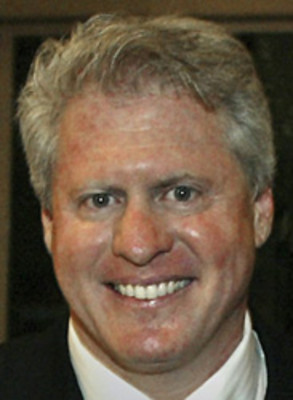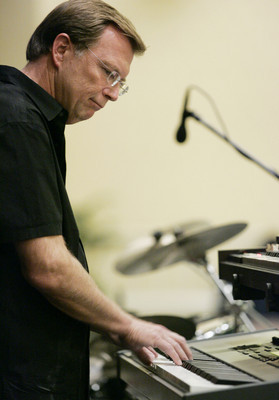500,000 votes thrill Libertarian hopeful
Wayne Allyn Root doesn't like to admit he was wrong.
The Libertarian Party vice presidential nominee, a Las Vegas sports handicapper, had confidently predicted his ticket, headed by former Republican congressman Bob Barr, would top 1 million votes.
According to unofficial tallies, it was less than half that, 498,600. Root contends that some states are still counting outstanding ballots and it will end up over half a million.
"I am absolutely thrilled we got 500,000 votes," the irrepressible Root said last week.
He did allow that it wasn't his ideal outcome. "I am absolutely disappointed we didn't get a million or more, no question about it, but I think it was just impossible circumstances."
Root noted that it was the second-highest vote total ever for a Libertarian candidate. In 1980, Libertarian Edward Clark got more than 900,000 votes, 1.1 percent of that year's total in the election that saw President Reagan beat incumbent President Carter.
The Barr/Root ticket took 0.4 percent of this year's votes, according to preliminary tallies. The independent ticket headed by Ralph Nader was the top non-major-party vote-getter, with 676,547 votes, 0.5 percent.
In Nevada, where Root played up the favorite son angle and argued that the state was a case study in the kind of personal freedom he championed, Barr/Root got 4,258 total votes, 0.4 percent of the statewide vote and behind Nader's 0.6 percent.
Every minor-party ticket underperformed "none of these candidates," which received 6,251 votes, 0.7 percent, in the presidential contest.
Root, who next year is releasing a book titled "The Conscience of a Libertarian: Empowering the Citizen Revolution With God, Guns, Gambling and Tax Cuts," doesn't think these examples make him look bad. Quite the opposite: He cites them as proof that people are willing to vote for Libertarians when they don't think they're throwing their votes away. The problem is that the presidential race was so high-profile and high-stakes that few wanted to go with a possible spoiler.
Cases in point: Conservative activist Chuck Muth held his nose and voted for Republican John McCain, as did the Review-Journal's syndicated libertarian columnist, Vin Suprynowicz, who said he had never voted Republican in his life but felt he had to do whatever he could to stop Democrat Barack Obama.
Root made the logic-defying argument that his 800-plus media appearances were a powerful force for the ticket, but part of the reason they didn't do better was that the media conspired to ignore them. He said he's confident he will be atop the party's ticket in 2012, although he is considering running for mayor of Las Vegas in 2011.
"Add a little money, put me at the head of the ticket, I think you're talking 3, 4 million votes," he said. "That's my long-term plan, disciplined and realistic."
BELLWETHER TOLLS
Is Nevada the nation's No. 1 bellwether state in presidential elections?
People used to think that honor belonged to Missouri. From 1904 to 2004, the Show-Me State threw its electoral votes to the winner of the election every time except 1956, when it chose Adlai Stevenson over Dwight Eisenhower.
But on Tuesday, McCain narrowly won Missouri, putting the state on the wrong side of history, while Nevada went for winner Obama, improving the state's batting average.
"Nevada since 1912 only once has not voted for the candidate who became president of the United States," noted state archivist Guy Rocha. That was in 1976, when the Silver State preferred Gerald Ford to Jimmy Carter.
"With Missouri now getting one more tick against it, arguably Nevada has moved up the ranks to being the bellwether state," Rocha said. "The next election will make it 100 years (since Nevada started picking winners). Nevada may be the state that's now the most consistent in supporting winning presidential candidates."
The natural next question about Nevada's bellwether status is, "Why?" And that one perplexes Rocha. Missouri made sense as a microcosm of the nation: It was the Midwestern heartland, with representative swaths of both urban and rural, agriculture and industry. But is Nevada the Great American Normal?
"Nevada has always been maverick, nonconformist, libertarian," Rocha said. "Nevada has gambling, divorce, legalized prostitution, boxing -- all the things that historically made the state a pariah."
A theory was proposed: All those characteristics have historically given Nevada the status of America's id, the nation's savage dark unconscious of unchecked desires and instincts. Perhaps our politics, too, come from that part of the national personality.
Perhaps, Rocha said. "It's not easily explained, but keep an eye on Nevada."
BAD GRADES
Buried in the recent blizzard of polling was some bad news for a couple of Nevadans: Jim Gibbons and Harry Reid.
A Rasmussen Reports poll a week before Election Day that predicted Obama would win the state also asked Nevada voters what they thought of Gov. Gibbons' performance.
Just 25 percent said Gibbons was doing a good or excellent job; 43 percent rated him poorly. Gibbons was less well-regarded than President Bush, who got good or excellent marks from 32 percent of Nevadans and a poor rating from 50 percent.
In a national survey conducted by Rasmussen on Election Day, Reid, the majority leader of the U.S. Senate, suffered an arguably worse fate than disapproval: anonymity.
More than a quarter of voters nationwide said they didn't know who he was. The Nevada Democrat, only the most powerful person in the legislative branch of the United States government, was unknown to 27 percent of those surveyed, including 30 percent of Democrats, 23 percent of Republicans and 29 percent of independents.
Twenty-eight percent of those polled had a favorable view of Reid, while 42 percent viewed him unfavorably.
BAND OF LOSERS
The D.C. rock band that Rep. Jon Porter, R-Nev., used to play in is likely no more.
Three members of the five-piece ensemble known as the Second Amendments won't be back in the next Congress, including Porter, who lost his bid for re-election on Tuesday to Democrat Dina Titus.
Rep. Kenny Hulshof, R-Mo., retired from Congress to run for governor (and lost). Rep. Bill Sali, R-Idaho, was to replace Hulshof on the drums, but he lost on Tuesday, too. (Yes, we are officially in a strange new era: A Republican has lost an election in Idaho.)
Also, Rep. Dave Weldon, R-Fla., the bass player, retired, the Washington newspaper Roll Call reported last week, leaving only Rep. Thaddeus McCotter, R-Mich., the guitarist, and Rep. Collin Peterson, D-Minn., the singer.
McCotter told Roll Call it was unlikely he and Peterson would restart the group with new members.
Porter, who played keyboards, brought the group to Las Vegas earlier this year for a benefit concert for military families.
Titus liked to bring up Porter's musical gig, saying the Republican had been playing the same old song for too long and Nevadans wanted to change the tune.
Contact reporter Molly Ball at mball @reviewjournal.com or 702-387-2919.


















